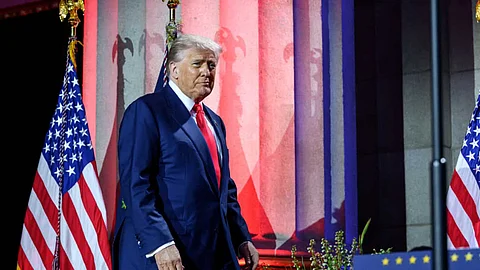

Washington/New Delhi: US President Donald Trump on Thursday imposed sweeping sanctions on Russia’s two biggest oil companies, Rosneft and Lukoil, in a sharp policy shift on Moscow’s war in Ukraine — a move that sent global oil prices surging nearly 5 percent and prompted India to consider cutting its Russian imports.
Follow Energy Watch on X
The sanctions target the two oil giants, which together account for more than 5 percent of global oil output, and mark a dramatic U-turn by Trump, who only last week said he and Russian President Vladimir Putin would soon hold a summit in Budapest to try to end the war in Ukraine.
While the financial impact on Russia may be limited in the short term, the sanctions are widely seen as a signal of Trump’s intent to squeeze Moscow’s finances and push the Kremlin towards a peace deal.
The sanctions have already prompted Chinese state oil majors to suspend Russian oil purchases in the short term, trade sources said. Refiners in India, the largest buyer of seaborne Russian oil, are also expected to sharply cut their crude imports. "The sanctions by the US on certain Russian crude oil producers are likely to impact the purchases by India as these suppliers accounted for about 60 percent of the volumes purchased. While India can substitute the purchases from Russia with suppliers from the Middle East and other geographies, the import bill for crude oil would increase. On an annual basis the replacement by market priced crude would lead to an increase in import bill by less than 2 percent," said Prashant Vasisht, Senior Vice President and Co-Group Head, Corporate Ratings, ICRA Limited.
A drop in demand from Russia’s two biggest customers could strain Moscow’s oil revenues and force global importers to seek alternative supplies — pushing prices higher.
Trump, in his latest about-face on the conflict, said on Wednesday that the planned Putin summit was off because it would not achieve the outcome he wanted. He added that his many “good conversations” with Putin did not “go anywhere.”
“We cancelled the meeting with President Putin — it just didn't feel right to me,” Trump told reporters at the White House. “It didn’t feel like we were going to get to the place we have to get. So I cancelled it, but we’ll do it in the future.”
Russia called the new US sanctions unproductive and said its conditions for ending the war — which Kyiv and many European countries view as tantamount to surrender — remain unchanged.
Meanwhile, European Union leaders and Ukrainian President Volodymyr Zelenskiy met in Brussels on Thursday to discuss funding for Ukraine. Momentum is building to use frozen Russian assets to provide a 140 billion euro (USD 163 billion) loan to Kyiv. Moscow warned it would deliver a “painful response” if those assets were seized.
In a parallel move to tighten the pressure, the EU approved its 19th package of sanctions, including a ban on Russian liquefied natural gas (LNG) imports.
The bloc has reduced its reliance on Russia by about 90 percent since 2022 but still imported over 11 billion euros worth of Russian energy in the first eight months of this year. LNG now represents the largest share of the EU’s remaining Russian energy imports.
The EU also blacklisted three Chinese companies, saying they were major buyers of Russian crude oil and provided “substantial” revenue to Moscow. Beijing threatened to retaliate with unspecified countermeasures.
Unveiling the new oil sanctions, US Treasury Secretary Scott Bessent said Washington’s goal was to choke off Russia’s ability to fund Europe’s biggest land war since World War Two and warned that further measures could follow.
Russian oil and gas revenue — down 21 percent year-on-year — accounts for around one-quarter of the federal budget and remains Moscow’s most important source of cash for its war in Ukraine, now in its fourth year.
However, analysts noted that Russia’s main revenue comes from taxing production, not exports, which could soften the immediate blow to its finances.
Maria Zakharova, spokeswoman for the Russian Foreign Ministry, dismissed the sanctions’ likely impact, saying Moscow had developed a “strong immunity” to such restrictions.
Ukrainian President Volodymyr Zelenskiy welcomed the US sanctions, calling them “very important,” but urged Washington and its allies to exert even more pressure on Moscow to bring about a ceasefire.
Oil prices jumped 5 percent on Thursday on fears that the sanctions would disrupt global supply. Indian oil industry sources said refiners were preparing to significantly reduce Russian crude imports.
Some analysts said Russia may be forced to further discount its oil to offset the perceived risk of US secondary sanctions, though that could be cushioned by the global price surge.
After an August summit with Putin in Alaska, Trump had dropped his demand for an immediate ceasefire and leaned toward Moscow’s preference for negotiating an overall peace settlement. But in recent days, he has reverted to calling for an immediate ceasefire, a stance supported by Kyiv but repeatedly rejected by Moscow.
Follow Energy Watch on LinkedIN
Russia has said it opposes a ceasefire because it believes it would only serve as a temporary pause before fighting resumes, allowing Ukraine to re-arm at a time when Moscow claims it holds the initiative on the battlefield.
